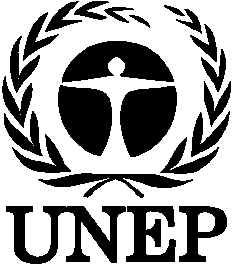

Environment
Programme
GENERAL
UNEP/POPS/INC.1/INF/8
15 June 1998
ORIGINAL: ENGLISH
| UNITED NATIONS |
EP |
|
United Nations Environment Programme
|
Distr. GENERAL UNEP/POPS/INC.1/INF/8 ORIGINAL: ENGLISH |
INTERGOVERNMENTAL NEGOTIATING COMMITTEE FOR AN
INTERNATIONAL LEGALLY BINDING INSTRUMENT
FOR IMPLEMENTING INTERNATIONAL ACTION ON
CERTAIN PERSISTENT ORGANIC POLLUTANTS
First session
Montreal, 29 June-3 July 1998
Item 4 of the provisional agenda
PREPARATION OF AN INTERNATIONAL LEGALLY BINDING INSTRUMENT FOR
IMPLEMENTING INTERNATIONAL ACTION ON CERTAIN
PERSISTENT ORGANIC POLLUTANTS
Decision 18/32 on persistent organic pollutants of the Governing Council
of the United Nations Environment Programme
The secretariat has the honour to transmit to the International Negotiating Comittee, in the annex to the present note, the text of decision 18/32 on persistent organic polutants (POPs), adopted on 25 May 1995 by the Governing Council of the United Nations Environment Programme (UNEP).
Annex
18/32. Persistent organic pollutants
The Governing Council,
Aware that persistent organic pollutants pose major and increasing threats to human health and the environment,
Noting chapter 17 (Protection of the oceans) of Agenda 21 which identifies reduction and elimination of emissions and discharges of organohalogens and other persistent organic pollutants as priority action, as
well as chapter 19 (Environmentally sound management of toxic chemicals) and other relevant conventions, and the precautionary approach as stated in principle 15 of the Rio Declaration on Environment and Development, 1/
Recognizing the progress on a programme of action to protect the marine environment from degradation by land-based activities, including persistent organic pollutants, in the preparation for the Intergovernmental Conference to Adopt a Global Programme of Action for the Protection of the Marine Environment from Land-based Activities, to be held in Washington, D.C., from 23 October to 3 November 1995,
Noting ongoing regional cooperation to assess the risks associated with persistent organic pollutants, as well as to develop strategies and action to deal with these substances,
Aware that many persistent organic pollutants are transported over long distances globally by air and sea and therefore exist in measurable and increasing concentrations far from the original site of origin,
Mindful of the urgent need to improve scientific understanding of persistent organic pollutants, their sources, transport, and pathways as well as their effects on human health, environment and their socio-economic effects as a basis for development and adoption of effective and realistic response strategies, policies, and measures at the national, regional and global levels,
1. Invites the Inter-Organization Programme for the Sound Management of Chemicals, working with the International Programme on Chemical Safety, and the Intergovernmental Forum on Chemical Safety, with the assistance of an appropriate ad hoc working group, to initiate an expeditious assessment process, initially beginning with the short-list of persistent organic pollutants that is currently being discussed by the United Nations Economic Commission for Europe in the context of the Convention on Long-range Transboundary Air Pollution, adopted in Geneva on 13 November 1979. This process should:
(a) Consolidate existing information available from the International Programme on Chemical Safety, the Economic Commission for Europe, and other relevant sources on the chemistry and toxicology of the substances concerned (particularly the impact on human, plant, and animal health);
(b) Analyse the relevant transport pathways and the origin, transport, and the deposition of these substances on a global scale;
(c) Examine the sources, benefits, risks and other considerations relevant to production and use;
(d) Evaluate the availability, including costs and effectiveness, of preferable substitutes, where applicable;
(e) Assess realistic response strategies, policies and mechanisms for reducing and/or eliminating emissions, discharges and losses of persistent organic pollutants.
In undertaking these tasks, the circumstances of developing countries and countries with economies in transition should be taken into account;
2. Invites, based on the results of this process and the outcome of the Washington Conference, the Intergovernmental Forum on Chemical Safety to develop recommendations and information on international action, including such information as would be needed for a possible decision regarding an
appropriate international legal mechanism on persistent organic pollutants, to be considered by the Governing Council and the World Health Assembly no later than in 1997;
3. Requests the Executive Director to support the work of this process as necessary;
4. Calls on States, the United Nations and its specialized agencies, including regional economic organizations, and other relevant organizations to participate actively and provide contributions both for the assessment process and for the participation of developing countries and countries with economies in transition.
9th meeting
25 May 1995
-----